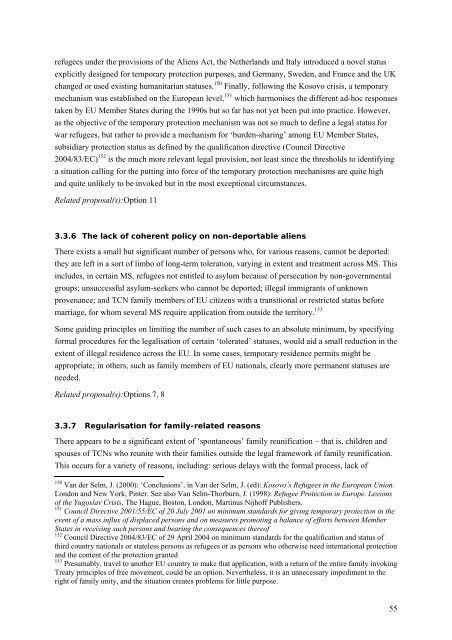REGINE Regularisations in Europe Final Report - European ...
REGINE Regularisations in Europe Final Report - European ...
REGINE Regularisations in Europe Final Report - European ...
Create successful ePaper yourself
Turn your PDF publications into a flip-book with our unique Google optimized e-Paper software.
efugees under the provisions of the Aliens Act, the Netherlands and Italy <strong>in</strong>troduced a novel status<br />
explicitly designed for temporary protection purposes, and Germany, Sweden, and France and the UK<br />
changed or used exist<strong>in</strong>g humanitarian statuses. 150 F<strong>in</strong>ally, follow<strong>in</strong>g the Kosovo crisis, a temporary<br />
mechanism was established on the <strong>Europe</strong>an level, 151 which harmonises the different ad-hoc responses<br />
taken by EU Member States dur<strong>in</strong>g the 1990s but so far has not yet been put <strong>in</strong>to practice. However,<br />
as the objective of the temporary protection mechanism was not so much to def<strong>in</strong>e a legal status for<br />
war refugees, but rather to provide a mechanism for ‘burden-shar<strong>in</strong>g’ among EU Member States,<br />
subsidiary protection status as def<strong>in</strong>ed by the qualification directive (Council Directive<br />
2004/83/EC) 152 is the much more relevant legal provision, not least s<strong>in</strong>ce the thresholds to identify<strong>in</strong>g<br />
a situation call<strong>in</strong>g for the putt<strong>in</strong>g <strong>in</strong>to force of the temporary protection mechanisms are quite high<br />
and quite unlikely to be <strong>in</strong>voked but <strong>in</strong> the most exceptional circumstances.<br />
Related proposal(s):Option 11<br />
3.3.6 The lack of coherent policy on non-deportable aliens<br />
There exists a small but significant number of persons who, for various reasons, cannot be deported:<br />
they are left <strong>in</strong> a sort of limbo of long-term toleration, vary<strong>in</strong>g <strong>in</strong> extent and treatment across MS. This<br />
<strong>in</strong>cludes, <strong>in</strong> certa<strong>in</strong> MS, refugees not entitled to asylum because of persecution by non-governmental<br />
groups; unsuccessful asylum-seekers who cannot be deported; illegal immigrants of unknown<br />
provenance; and TCN family members of EU citizens with a transitional or restricted status before<br />
marriage, for whom several MS require application from outside the territory. 153<br />
Some guid<strong>in</strong>g pr<strong>in</strong>ciples on limit<strong>in</strong>g the number of such cases to an absolute m<strong>in</strong>imum, by specify<strong>in</strong>g<br />
formal procedures for the legalisation of certa<strong>in</strong> ‘tolerated’ statuses, would aid a small reduction <strong>in</strong> the<br />
extent of illegal residence across the EU. In some cases, temporary residence permits might be<br />
appropriate; <strong>in</strong> others, such as family members of EU nationals, clearly more permanent statuses are<br />
needed.<br />
Related proposal(s):Options 7, 8<br />
3.3.7 Regularisation for family-related reasons<br />
There appears to be a significant extent of ‘spontaneous’ family reunification – that is, children and<br />
spouses of TCNs who reunite with their families outside the legal framework of family reunification.<br />
This occurs for a variety of reasons, <strong>in</strong>clud<strong>in</strong>g: serious delays with the formal process, lack of<br />
150 Van der Selm, J. (2000): ‘Conclusions’, <strong>in</strong> Van der Selm, J. (ed): Kosovo’s Refugees <strong>in</strong> the <strong>Europe</strong>an Union.<br />
London and New York, P<strong>in</strong>ter. See also Van Selm-Thorburn, J. (1998): Refugee Protection <strong>in</strong> <strong>Europe</strong>. Lessons<br />
of the Yugoslav Crisis, The Hague, Boston, London, Mart<strong>in</strong>us Nijhoff Publishers.<br />
151 Council Directive 2001/55/EC of 20 July 2001 on m<strong>in</strong>imum standards for giv<strong>in</strong>g temporary protection <strong>in</strong> the<br />
event of a mass <strong>in</strong>flux of displaced persons and on measures promot<strong>in</strong>g a balance of efforts between Member<br />
States <strong>in</strong> receiv<strong>in</strong>g such persons and bear<strong>in</strong>g the consequences thereof<br />
152 Council Directive 2004/83/EC of 29 April 2004 on m<strong>in</strong>imum standards for the qualification and status of<br />
third country nationals or stateless persons as refugees or as persons who otherwise need <strong>in</strong>ternational protection<br />
and the content of the protection granted<br />
153 Presumably, travel to another EU country to make that application, with a return of the entire family <strong>in</strong>vok<strong>in</strong>g<br />
Treaty pr<strong>in</strong>ciples of free movement, could be an option. Nevertheless, it is an unnecessary impediment to the<br />
right of family unity, and the situation creates problems for little purpose.<br />
55
















